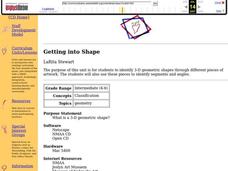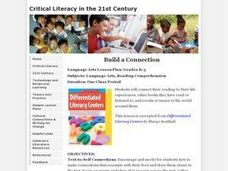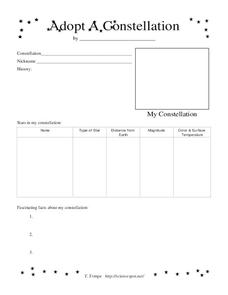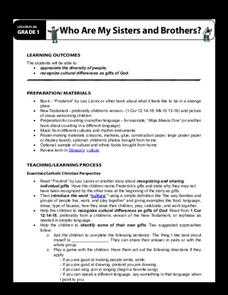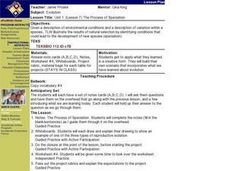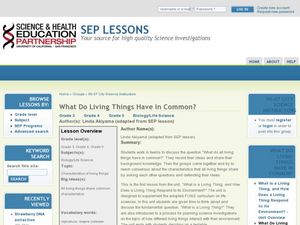Curated OER
Getting into Shape
Young scholars identify 3-D geometric shapes through different pieces of artwork. They examine and identify segments and angles. Students act out shapes and create a piece of artwork. Additional cross curriculum activities are listed.
Curated OER
Problem Solving Model
Use a vocabulary chart to introduce math functions. The class defines a list of mathematical vocabulary terms on a worksheet, as well as completes equations and expressions. They examine word problems and practice transcribing them into...
Curated OER
Identify Plant Nutrient Requirements
Students are given standard elemental nutrients, identify plant nutrient requirements based on criteria outlined in assessment instructment. They, are given standard elemental nutrients, provide all means and chemical symbols of plant...
Curated OER
Identifying Clouds
Students work in groups to research and prepare a report on cloud types. They present their findings to the class and take a group quiz competing for points. Students go outside and determine which type of clouds are visible on that day.
Curated OER
Rock On!
After five class sessions, young scientists will be able to identify common rock types: igneous, sedimentary, and metamorphic. This plan involves hands-on activities, includes various handouts and worksheets, and requires there to be...
Curated OER
Build a Connection
Learners discuss their personal connections with stories they've read in the past and identify techniques to connect with more stories. They create illustrations, construct task cards, and complete sentence stems based on books they read...
Curated OER
Cancer and the Cell Cycle - Biology Teaching Thesis
Identify the different stages of mitosis and what occurs in each stage with a straightforward biology lesson. Young scientists identify the importance of the cell cycle control in maintaining homeostasis, and then match the correct...
Curated OER
Identify That Culture
Students view various types of artwork and try to identify the culture being represented. Using a worksheet, they answer questions based on the artwork and the artist's use of color and technique. They research the artist's country of...
Curated OER
Web-Based Practice
Students explore technology by participating in a word structure activity. In this grammar lesson, students utilize the Writing Center computer software to practice keyboarding while identifying word formations in class. Students...
Curated OER
Is This a House for Hermit Crab?
First graders identify text that uses sequence or other logical order. They identify and interpret how different plants and animals inhabit different kinds of environments and have external features that help them thrive in different...
Curated OER
Review of the Five Senses
Students investigate the five senses. In this human biology lesson, students are given five items and identify which items match best with each of the senses. Students use objects such as a rock, hard candy, and a flower.
Curated OER
Adopt a Constellation
Students adopt a constellation and find detailed information about their constellation. In this constellation lesson plan, students use the web to find information about a constellation of their choice. They identify the history of the...
Curated OER
Health Education: Childhood Diseases and Health Issues
Fourth graders research childhood diseases and health conditions. In this personal health lesson plan, 4th graders identify problems associated with and measures to control common childhood diseases or conditions such as asthma,...
Curated OER
Who are My Sisters and Brothers?
Students explore religion by completing a cultural diversity activity. In this human compassion lesson, students identify all of "God's Children" as their sisters and brothers. Students read the book Frederick in class and listen to...
Curated OER
Make Bark and Leaf Rubbings
Pupils explore natural resources by creating art from plant materials. In this leaf rubbings lesson, students identify the plants that shed bark and leaves and discuss how it helps them survive in specific environments. Pupils utilize a...
EngageNY
Solution Sets to Inequalities with Two Variables
What better way to learn graphing inequalities than through discovering your own method! Class members use a discovery approach to finding solutions to inequalities by following steps that lead them through the process and...
Curated OER
Rock Around the House
Pupils discover the three types of rock. They weigh and examine rock specimens.
Curated OER
Johnny Appleseed Reading and Writing
First graders explore language arts by reading a classic story in class. In this word choice lesson, 1st graders read the story of Johnny Appleseed and identify the descriptive words and sentences the author used to entice the reader....
Curated OER
Genetics 4 Mutations
Students identify and illustrate how changes in DNA cause mutations and evaluate the significance of these changes. They illustrate a chromosomal mutation such as duplication, deletion, inversion, and translocation.
Curated OER
American Indian Homes in Kansas
First graders explore culture by researching U.S. history. For this American Indian lesson, 1st graders discuss the geography of Kansas and the different Native American tribes that inhabited the state and the types of homes they lived...
Curated OER
It's Alive
Students identify the differences between a nonliving and living thing. They describe what is needed for any living thing to survive. They create one page for the class book identifying why the object is a living thing.
Curated OER
French Cheese
Students discover how cheese in France is made. Using the internet, they read articles about the importance of cheese in the French culture. They identify the various French cheeses and locate the areas in France that manufacture...
Curated OER
The Process of Speciation
Students illustrate the results of natural selection by identifying conditions that could lead to the development of new species (speciation) based on a given description of environmental conditions and description of variation within a...
Curated OER
What Do Living Things Have In Common?
Students explore the concept of classification. In this classification lesson, students collaborate to create lists of living thing similarities in order to differentiate between living and non-living things. Students create a list of...
